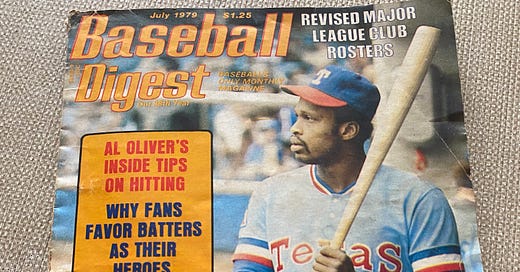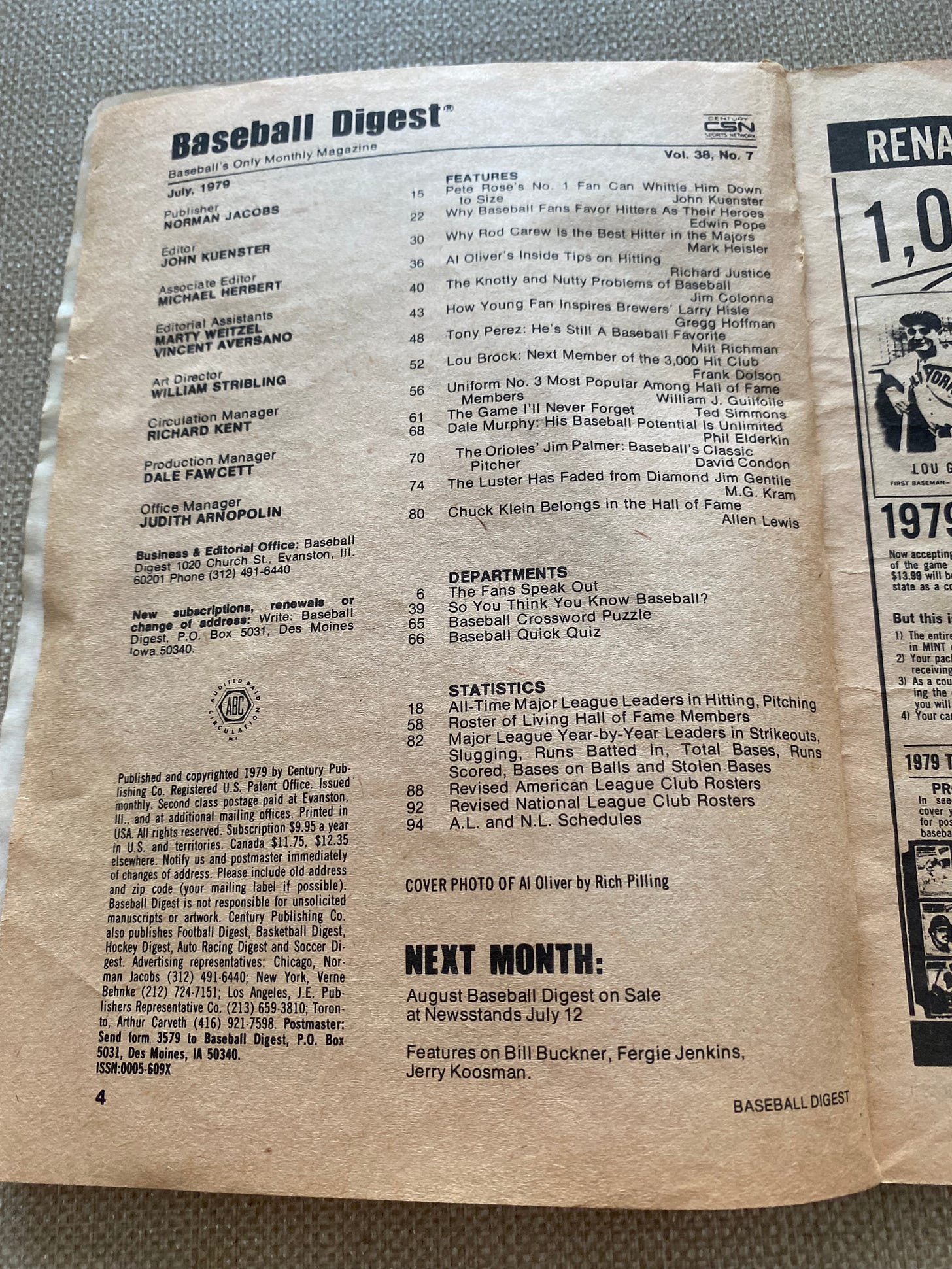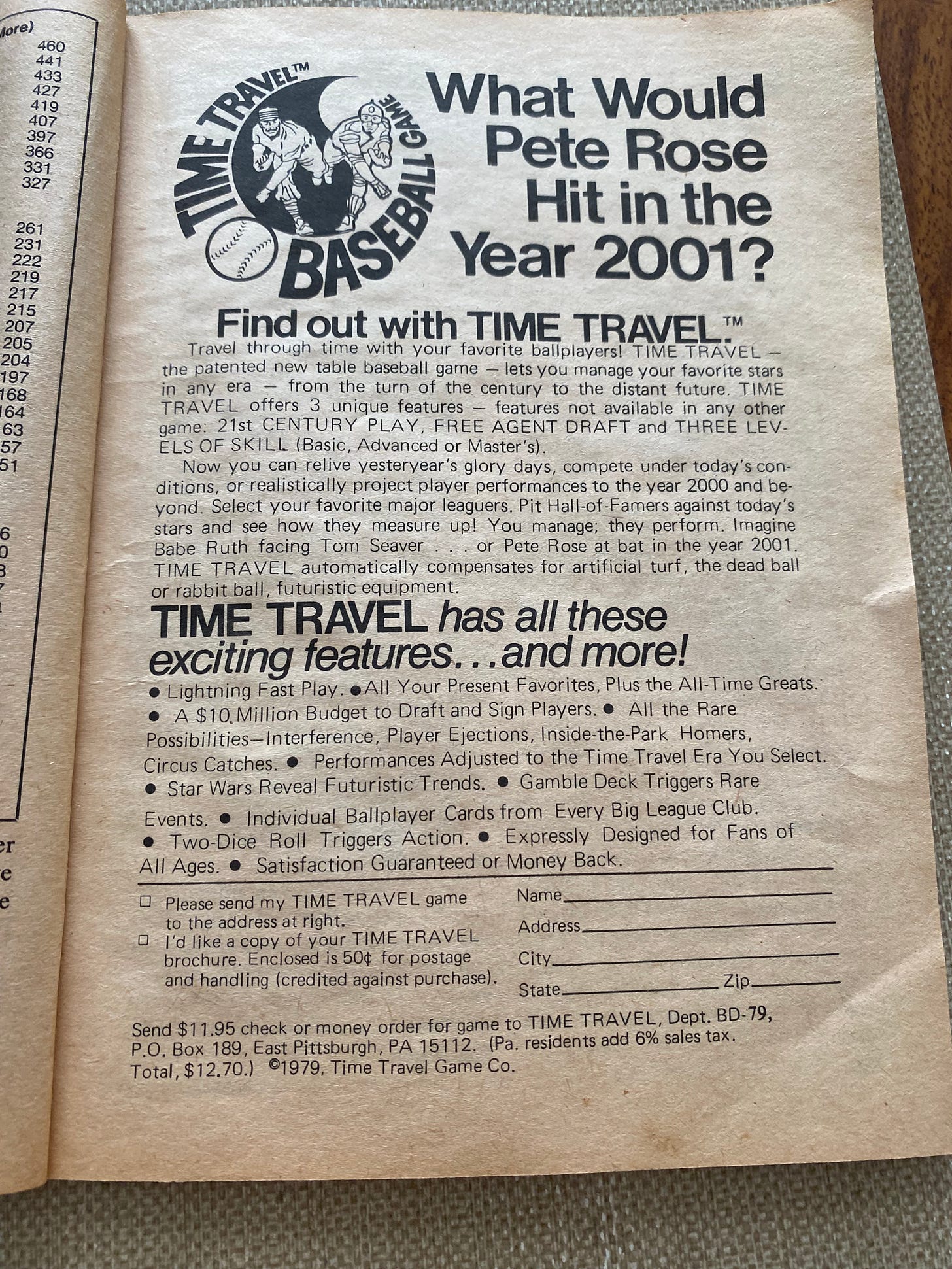The Baseball Digest Archives
I’m still winding down from the holiday weekend, so once again today’s newsletter is slightly shorter than usual. Back to normal on Wednesday
July 1979
Seeing Al Oliver as the cover subject of this month’s issue was nice. He is precisely the type of player who is often in danger of fading from memory as the years roll on. The old phrase “professional hitter” applies perfectly to him. He hit between .280-.310 year after year, with ideal doubles power. He was a Texas Ranger in this cover photo, but he was best known as a member of the Pirates’ Lumber Company teams in the tail end of that era, often overshadowed by bigger stars on that team. I hate to use the phrase Hall Of The Very Good because it’s usually used as an insult, but if you use it to acknowledge an outstanding career which falls short of Cooperstown level, then Al Oliver is your man.
Speaking of Cooperstown, as I have mentioned in the past, reading Baseball Digest every month was one of the factors that really spurred my interest in the Hall Of Fame. The magazine frequently featured articles discussing potential candidates, such as this month’s look at Chuck Klein. The article does address the reasons why he had not yet been inducted by 1979; his peak was relatively brief, and his home ballpark of Baker Bowl was a bandbox, which elevated his offensive numbers. This article was well-timed. Klein would in fact be elected by the Veterans Committee as part of the Class of 1980. FWIW I classify him as a bit borderline - modern analysis helps put his extreme home/road splits into better perspective. It’s that short peak that’s more of a sticking point. There are players better than him that are not in, but he is also better than several of the questionable choices that had been made in the previous dozen years.
As you can see the issue also contains an article predicting that Lou Brock will be the next player to reach 3000 career hits. As the season began Brock, whose final major league season was in 1979, had a lead of 31 hits over Carl Yastrzemski. Both players surpassed the milestone that year, with Brock accomplishing the feat a month or so before Yaz did. Yaz played until 1983, so in the long run he blew well past Brock on the career hits list.
The issue also predicts future stardom for Dale Murphy. The beginning of his career is quite fascinating. He reached the majors with a massive amount of hype, but I’m not sure how many people recall that he originally came up as a catcher. He hit that mental block when it came to throwing the ball back to the pitcher, and he brought those struggles into the batter’s box with him, so it him took a few years to fully develop as a hitter. The Braves switched him to first base in 1978, but he still hadn’t made the leap, leading the league in strikeouts. 1979 was the first year in which he started to show his potential; the Braves finally converted him to center field in the 1980 season, and he spent the next several years as one of the top stars in the game.
I’ll close with an ad for another one of those tabletop games that were constantly advertised in the magazine. This one was called Time Travel Baseball. If I recall correctly many of these games heavily promoted the ability to match players from different eras against each other. This one hyped a feature that would place players in the future. I’m curious to know what it means to project how Pete Rose, or any other player, would hit in 2001. I suppose I could send the game manufacturer a check or money order to find out, but I have a sneaking suspicion that the company no longer exists.
We’ll Always Have Paris
The official Opening Ceremony takes place on July 26, but some of the preliminary events begin even before that, so we are only a bit more than 2 weeks away from the start of the Olympics. I spend a LOT of time watching the Games, so I’m in full preparation for my marathon view. I haven’t yet decided how heavily I want to fill this newsletter with Olympic content during the Games. That remains to be seen.
There has been a dramatic change in how audiences are able to consume the event. Back when it was a network-only telecast, we were all limited to what the broadcast provided. That actually helped me manage my day; one of my policies is that I don’t watch sports in which the competitors wear top hats. As a result when equestrian was on the air that meant I could do something else. Nowadays with all of the cable TV coverage in addition to Peacock, it’s a Choose Your Own Adventure for any individual viewer. I can view what I want to see when I want to see it.
The 3 mainstays of NBC’s coverage remain track & field, swimming, & gymnastics. I’m a big fan of the first two. I generally don’t watch much gymnastics, but I do try to catch as much of Simone Biles as I can. It would be silly to pass up an opportunity to watch someone that historically great. Beyond that, I love watching volleyball - both indoor and beach. I know that Americans love to mock the inclusions of badminton & table tennis, equating them to the games that we have played in backyards. But look at it this way; the level of skill that world class volleyball players demonstrate is an entirely different universe from ordinary folk like us. Same deal with badminton & table tennis.
I also don’t spend much Olympic time watching sports that I can easily access otherwise. I watch little basketball before the elimination rounds, and I barely watch any tennis at all. I try my best to follow many of my favorite Olympic sports outside of the Olympic cycle, which was much easier in the days before NBC pulled the plugs on NBCSN & the Olympic Channel. Sports that I would place in that category include water polo and what I consider the biggest mystery sport - handball. The United States never fields competitive handball squads, and I have no idea why. Watch a game and the skill set the sport requires is obvious - explosive quickness and elusiveness. It seems like it should be easy to recruit players from college basketball programs and teach them handball. Besides, many of us have played the sport in high school gym class, so it’s not completely unfamiliar. I am convinced that if the US makes the commitment, we could eventually become a world power in handball.
The most basic sport that there is a simple race - who is the quickest to get from point A to point B. That brings up rowing, canoe/kayak, track cycling, and BMX as other sports that I enjoy watching. I’m not as big of a fan of road cycling; those marathon races last much too long to hold my interest. I have enjoyed the recent introductions of faster paced forms of sport - rugby sevens & 3x3 basketball. Both are played briskly, with constant action, and each game is completed in a short enough time frame that it only takes up a brief amount of my time to follow.
Even with everything that I have just mentioned, this only scratches the surface of the Olympic program. If I may borrow from the old ABC tagline, the Games promise many thrills of victory, many agonies of defeat, and an unlimited supply of the human drama of athletic competition. Can’t wait.
Closing Laughs
Don’t forget that it’s too early for hot takes on the All-Star Game rosters. Injury replacements and roster replacements for pitchers that threw on the Sunday preceding the game are always necessary. No need to fire up the outrage machine just yet. Thank you for attending my TED talk. See you all again on Wednesday.







